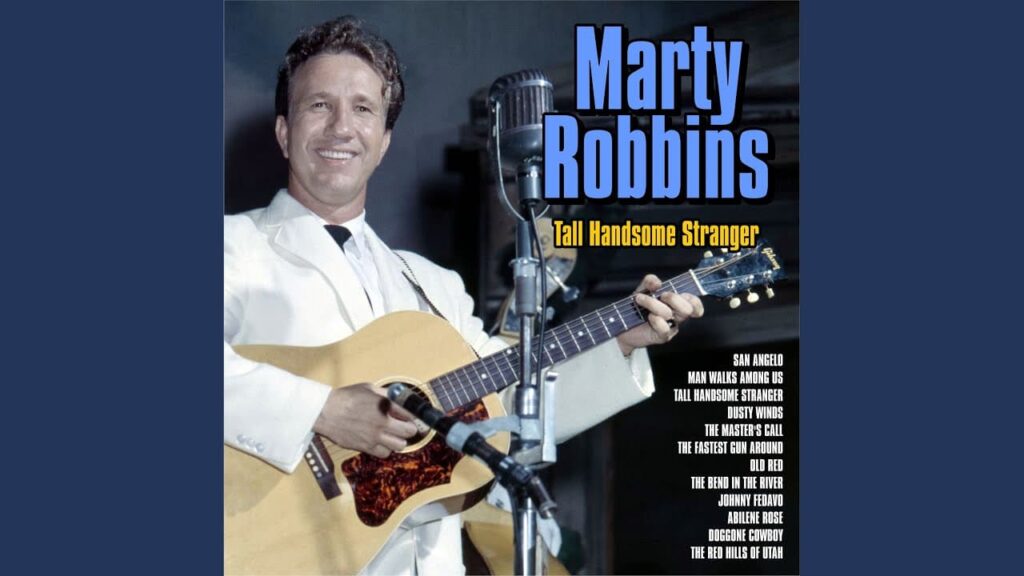
A Soul’s Awakening in the Wild West: The Profound Journey from Outlaw to Redemption
Marty Robbins‘ magnificent and deeply spiritual ballad, “The Master’s Call”, stands as a powerful cornerstone of his seminal 1959 concept album, “Gunfighter Ballads and Trail Songs”. While not a standalone charting single in the traditional sense, this album itself was a groundbreaking success, soaring to number 6 on the Billboard Top Pop Albums chart and cementing Robbins‘ legacy as the definitive voice of the Western ballad. “The Master’s Call” is a quintessential example of Robbins‘ unique ability to weave compelling narratives, often with a moral compass, into his music. Its place within such an iconic and influential album ensured its widespread appreciation, becoming a cherished piece for countless listeners who admired Robbins‘ storytelling prowess and his heartfelt delivery of tales from the American frontier.
The story behind “The Master’s Call” is a vivid and dramatic narrative, painting a picture of conversion and spiritual redemption set against the rugged backdrop of the Old West. Written by Marty Robbins himself, the song tells the tale of a hardened cowboy, perhaps an outlaw or simply a man accustomed to a wild, untamed life, who experiences a profound spiritual awakening during a violent thunderstorm. The terrifying forces of nature become a metaphor for divine intervention, shaking him to his core and leading him to seek salvation. This narrative mirrors a recurring theme in Western literature and folklore: the transformative power of nature and the search for meaning in a harsh world. Robbins, with his meticulous research and deep appreciation for Western history, brought these stories to life with an authenticity that transcended mere entertainment, offering listeners not just a song, but a moral fable.
The meaning of “The Master’s Call” is a powerful exploration of spiritual awakening, repentance, and the search for redemption in the face of one’s past sins. It speaks to the transformative moment when a person, often at their lowest point or in the midst of a crisis, hears a higher calling and chooses a path of faith. The song uses the imagery of a violent storm as a catalyst for this conversion, symbolizing the tumultuous internal struggle and the overwhelming power of the divine. Lines like “Then I heard the Master’s call / And I knew I had to fall” convey the overwhelming nature of this spiritual experience, a moment of surrender and profound change. It’s a testament to the belief that even the most hardened souls can find grace and turn towards a path of righteousness, finding peace in faith and shedding the burdens of a troubled past.
Marty Robbins‘ vocal performance on “The Master’s Call” is nothing short of breathtaking. His rich, resonant baritone perfectly conveys the gravitas of the narrative, moving from the initial fear and wildness of the cowboy to a profound sense of awe and spiritual peace. There’s a sincerity and depth in his delivery that makes the listener believe every word, truly feeling the dramatic shift in the protagonist’s soul. The musical arrangement, typical of the “Gunfighter Ballads” album, is sparse yet incredibly effective, relying on acoustic guitar and subtle percussion to create an atmosphere that is both grand and intimate. It allows Robbins‘ voice and the powerful lyrics to remain at the forefront, creating a compelling narrative that is both musically and emotionally resonant.
Listening to “The Master’s Call” today evokes a deep sense of nostalgia for a golden era of musical storytelling, when artists like Marty Robbins used their craft to explore profound themes of faith, morality, and human struggle within the evocative framework of the American West. It transports us back to a time when songs were not just melodies, but vivid narratives that stirred the imagination and touched the soul. For those of us who grew up with Robbins‘ incredible voice and his unparalleled ability to bring these tales to life, this song remains a powerful and moving testament to his enduring legacy, a stirring reminder that even in the darkest storms, there can be a light leading to redemption, answering “The Master’s Call.”